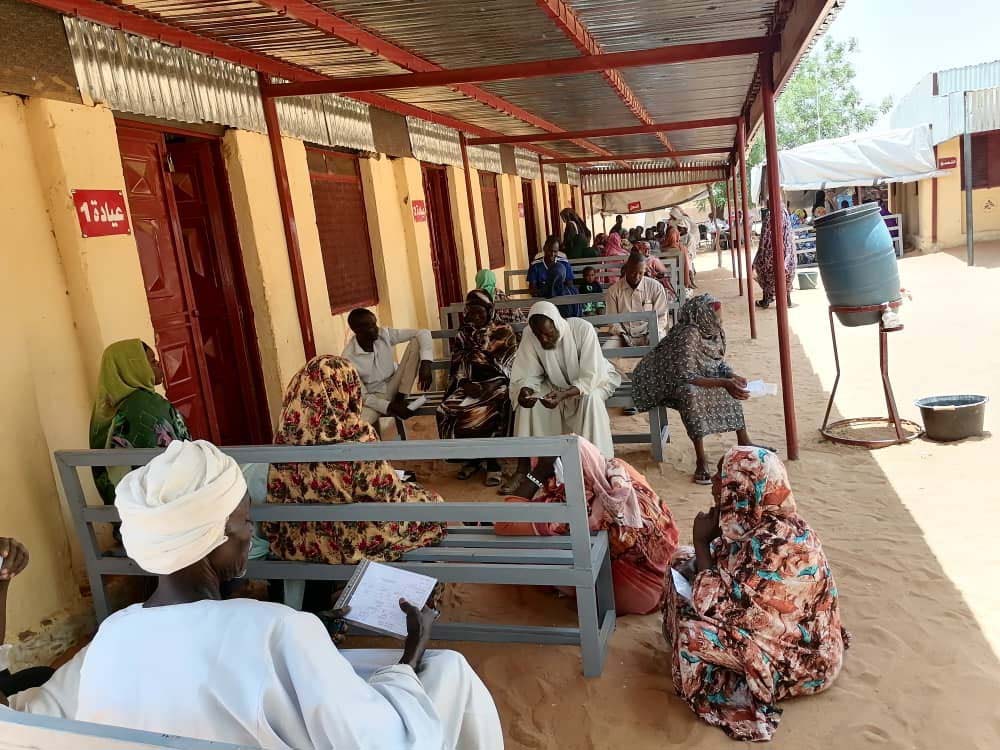Cholera suspected in North Darfur camp – medics sound alarm

Patients await treatment at the MSF clinic in Zamzam camp for displaced people, near to the North Darfur capital El Fasher in May 2023 (File photo: MSF)
Several suspected cases of cholera have been identified in Zamzam camp for displaced people, near to the North Darfur capital El Fasher, has prompted medical sources to sound the alarm, as health care in the state approaches complete collapse due to the ongoing hostilities.
Independent medical sources yesterday confirmed to Radio Dabanga that suspected cases of cholera have appeared in Zamzam camp on the outskirts of El Fasher, that has seen its population swelled considerably – some re-displaced three times – in the wake of months of clashes that erupted in mid-April 2023 between Sudanese Armed Forces (SAF) and the paramilitary Rapid Support Forces (RSF).
One of the medical sources told Radio Dabanga that the suspected cases of cholera (he could not give an exact figure) “portend a great danger in light of the current health situation,” which he described as “miserable”.
The doctor told Radio Dabanga that the health situation in the state is heading towards complete collapse; almost all hospitals and centres are out of service, except for the Saudi Hospital and four health centres.
The doctor underscored that North Darfur is now entirely reliant on medicines that reach El Fasher via airdrops, after most of the stock of medicines was burned when the kidney dialysis centre warehouse was destroyed, allegedly by RSF action, on June 23. He added: “The emergence of cholera cases in Zamzam camp at this time warns of a very great danger with the lack of stock of life-saving medicines.”
A volunteer in the field of child protection, Mubarak Abdullah, told Radio Dabanga that the health situation in the camp has become unbearable: “In Zamzam camp, fevers, watery diarrhoea [a term often used for unconfirmed cases of cholera], and malnutrition have appeared among children, in addition to pregnant women suffering from anaemia due to the lack of food, which will most likely lead to the birth of children who suffer and are vulnerable to disease.”
Mubarak pointed out that the camp is facing a problem with the water because it is not fit for drinking, in addition to the widespread spread of flies, and he continued: “All of these are factors that can cause cholera.”
A resident of Zamzam camp also confirmed to Radio Dabanga that children in the camp suffer from diarrhoea and fevers to a great extent. She highlighted that the camp needs environmental sanitation and spraying for mosquitoes and flies.
MSF conducted tests in Zamzam camp in North Darfur in April and found that more than 33 per cent of pregnant and lactating women were suffering from malnutrition, which poses a huge risk to the health of mothers and children. It said that it is likely that children born to malnourished mothers will also suffer from malnutrition.
In April, a vaccination campaign started in Nyala and several other places in the state, however, a South Darfur health official told Radio Dabanga that 13 of the state’s 21 localities are not included because of insufficient financial means.
Also in April, a six-day measles rubella vaccination campaign targeted about 1,360,500 children in Sennar state. Médecins Sans Frontières (MSF) reported a rise of suspected cases of measles and malnutrition among children in Sudan in August 2023. MSF was providing routine immunisation services to 30 to 40 children in White Nile state each day but said a mass vaccination campaign was needed. A month later, the UN High Commissioner for Refugees (UNHCR) sounded the alarm on a measles outbreak in White Nile state.
In mid-November, 2.2 million cholera and 7.5 million measles rubella vaccines were airlifted to Port Sudan for distribution to combat disease outbreaks across Sudan, in a collaborative effort by the World Health Organisation (WHO) and the UN Children’s Emergency Fund (UNICEF).











 and then
and then